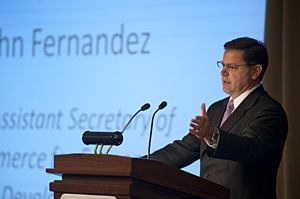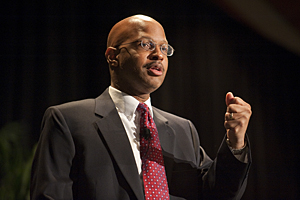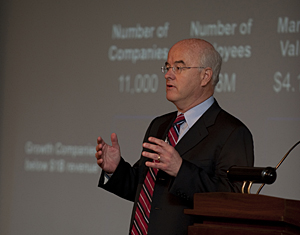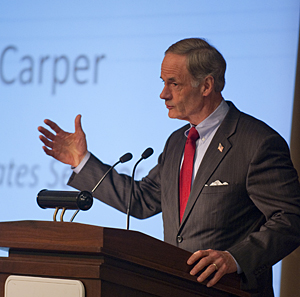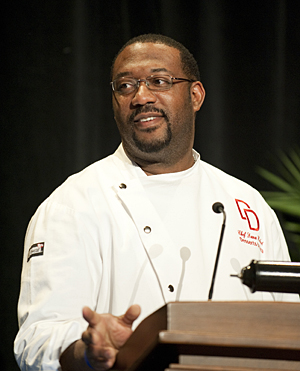
ADVERTISEMENT
- Rozovsky wins prestigious NSF Early Career Award
- UD students meet alumni, experience 'closing bell' at NYSE
- Newark Police seek assistance in identifying suspects in robbery
- Rivlin says bipartisan budget action, stronger budget rules key to reversing debt
- Stink bugs shouldn't pose problem until late summer
- Gao to honor Placido Domingo in Washington performance
- Adopt-A-Highway project keeps Lewes road clean
- WVUD's Radiothon fundraiser runs April 1-10
- W.D. Snodgrass Symposium to honor Pulitzer winner
- New guide helps cancer patients manage symptoms
- UD in the News, March 25, 2011
- For the Record, March 25, 2011
- Public opinion expert discusses world views of U.S. in Global Agenda series
- Congressional delegation, dean laud Center for Community Research and Service program
- Center for Political Communication sets symposium on politics, entertainment
- Students work to raise funds, awareness of domestic violence
- Equestrian team wins regional championship in Western riding
- Markell, Harker stress importance of agriculture to Delaware's economy
- Carol A. Ammon MBA Case Competition winners announced
- Prof presents blood-clotting studies at Gordon Research Conference
- Sexual Assault Awareness Month events, programs announced
- Stay connected with Sea Grant, CEOE e-newsletter
- A message to UD regarding the tragedy in Japan
- More News >>
- March 31-May 14: REP stages Neil Simon's 'The Good Doctor'
- April 2: Newark plans annual 'wine and dine'
- April 5: Expert perspective on U.S. health care
- April 5: Comedian Ace Guillen to visit Scrounge
- April 6, May 4: School of Nursing sponsors research lecture series
- April 6-May 4: Confucius Institute presents Chinese Film Series on Wednesdays
- April 6: IPCC's Pachauri to discuss sustainable development in DENIN Dialogue Series
- April 7: 'WVUDstock' radiothon concert announced
- April 8: English Language Institute presents 'Arts in Translation'
- April 9: Green and Healthy Living Expo planned at The Bob
- April 9: Center for Political Communication to host Onion editor
- April 10: Alumni Easter Egg-stravaganza planned
- April 11: CDS session to focus on visual assistive technologies
- April 12: T.J. Stiles to speak at UDLA annual dinner
- April 15, 16: Annual UD push lawnmower tune-up scheduled
- April 15, 16: Master Players series presents iMusic 4, China Magpie
- April 15, 16: Delaware Symphony, UD chorus to perform Mahler work
- April 18: Former NFL Coach Bill Cowher featured in UD Speaks
- April 21-24: Sesame Street Live brings Elmo and friends to The Bob
- April 30: Save the date for Ag Day 2011 at UD
- April 30: Symposium to consider 'Frontiers at the Chemistry-Biology Interface'
- April 30-May 1: Relay for Life set at Delaware Field House
- May 4: Delaware Membrane Protein Symposium announced
- May 5: Northwestern University's Leon Keer to deliver Kerr lecture
- May 7: Women's volleyball team to host second annual Spring Fling
- Through May 3: SPPA announces speakers for 10th annual lecture series
- Through May 4: Global Agenda sees U.S. through others' eyes; World Bank president to speak
- Through May 4: 'Research on Race, Ethnicity, Culture' topic of series
- Through May 9: Black American Studies announces lecture series
- Through May 11: 'Challenges in Jewish Culture' lecture series announced
- Through May 11: Area Studies research featured in speaker series
- Through June 5: 'Andy Warhol: Behind the Camera' on view in Old College Gallery
- Through July 15: 'Bodyscapes' on view at Mechanical Hall Gallery
- More What's Happening >>
- UD calendar >>
- Middle States evaluation team on campus April 5
- Phipps named HR Liaison of the Quarter
- Senior wins iPad for participating in assessment study
- April 19: Procurement Services schedules information sessions
- UD Bookstore announces spring break hours
- HealthyU Wellness Program encourages employees to 'Step into Spring'
- April 8-29: Faculty roundtable series considers student engagement
- GRE is changing; learn more at April 15 info session
- April 30: UD Evening with Blue Rocks set for employees
- Morris Library to be open 24/7 during final exams
- More Campus FYI >>
3:37 p.m., April 26, 2010----A trio of keynote speakers highlighted the third annual President's Forum on Innovation and Entrepreneurship, “Creating the Entrepreneurial Ecosystem,” which was held Friday, April 23, in Clayton Hall on the University of Delaware campus in Newark.
The speakers were John Fernandez, assistant U.S. secretary of commerce for economic development; David G. Thomson, author of the book Blueprint to a Billion; and David Bullock, co-author of Barack 2.0.
Fernandez, who was making what he called his “first visit to the First State,” thanked UD President Patrick Harker for hosting the forum.
Moving the economy forward
Fernandez then spoke about some of the challenges that face the federal government as it tries to pull the nation out of a recession and get the economy moving forward. “I think the [forum] really frames everything we're trying to do in terms of how we work as partners to rebuild an economy, and it is about this ecosystem, it's about partnerships, it's about all of us working together to create an environment that's really conducive for the kind of innovation-led economic development that we need,” he said.
Fernandez said there is still had a long way to go to get America out of these tough economic times, noting that “no-one is declaring victory” and that it is going to take a great deal of work for America to rebound.
While some people may look at the tough economic times and decide that this is not the best time to start a new business, he said he believes the opposite is actually true.
“Sometimes folks think that in a time when you have this kind of economic difficulty, strained credit markets, lots of uncertainty, it may be the worst time in the world to launch a business, but you know over the last century, it is exactly the opposite,” he said.
Fernandez went on to list IBM and Microsoft as a just a few examples of thriving companies founded during trying economic times.
What will help America get the economy back on track are innovative ideas partnered with sound business models, he said, adding that such ideas are not “just developed in the lab but they're brought to the market.”
Citing the leadership of Harker, U.S. Sen. Thomas R. Carper (D-Del.) and others in Delaware, Fernandez said, “We're seeing that same kind of ecosystem being developed, putting in place the partnerships that will be the real engine of innovation-led economic growth.”
Essentials for growth
Thompson, founder and chairman of The Blueprint Growth Institute and author of Blueprint to a Billion: Seven Essentials to Achieving Exponential Growth, talked about the pattern seen in the growing of successful companies.
Said Thompson, “My job here for you this morning is to prove to you that there is a quantitative success pattern to America's highest growth businesses that you can follow to beat the odds of failure, and that exceptional growth with be beyond your wildest dreams.
“Whether you're in government or in education or an entrepreneur, there is a predictable pattern not only to grow a exceptional growth company but also the cycle of America's growth companies.”
Thompson said that America has predictable cycles of revenue growth companies and that the peaks of these successful companies come every eight years, making the next peak in 2016 and the following peak in 2022.
“We are now at the 1993 level of recession,” Thompson said. “That may seem like really bad news but we are about to turn the corner and this is the same number of revenue growth companies that there were before the year 2000 and the great climb.”
What are the essentials that can be found recurring in successful companies? “I wanted to know the seven habits of highly effective companies, high growth companies, and I call these the seven essentials. Where do these seven essentials come from? They are in fact aligned to your revenue model,” he said.
Thompson started out by highlighting one of the essentials, which is having higher order benefits. “Companies that grew to a billion started at a single cup of coffee. They delivered higher order benefits,” he said. “The simplest story is Starbucks. The higher order benefit that Starbucks offers is the friendly barista, who customizes the coffee for you to make you feel important, so you go there to indulge and escape.”
It is also important to have marquee customers, such as athletes, market your product, Thompson said.
Stressing the need to perform all seven of the essentials in order to have a successful company, Thompson said, “Do you need to do all seven essentials? Absolutely. The more you use, the greater your odds of success. Why do many companies fail? Time and time again I've seen that two companies founded in the same year going after the same market -- one didn't make it because they only used three essentials, and the other one went to a billion. Using these seven essentials will improve your odds of success.”
Using social media
Bullock, a UD alumnus, was the luncheon keynote speaker and he spoke about social media and how it can be used to help economically.
“If you walk away with nothing else, this is it - [social media] starts the conversation, that's it. It starts it. It doesn't end it, just starts it. It's instant communication, it's vast and it's fast, meaning with the push of a button I can be in front of 4 or 5 million people instantaneously.”
Bullock said that social media creates an opportunity in the market because it allows organizations to be clearer with their communications.
But he stressed there are some drawbacks to social media communications. “No one is going to have a real loving and wonderful relationship with 100-plus characters on Twitter. It's not going to happen. Nothing's going to happen on Facebook that way. You can't make sales; you can only start the sales process.”
Calling the new world of social media the “virtual campfire,” Bullock pulled out his phone and explained how his entire business is in his pocket.
While focusing on the new media, Bullock also said that it's important to not forget about the old media as well. “The old media feeds the new media, and then the new media feeds the old media,” he said. “As an entrepreneur, know the trends, see the trends and use them to your advantage. That's what this is all about.”
In summary, Bullock said, “The key is knowing what and how you're going to use this stuff, and how it's going to promote your business, which is the most important part. You as the business owner do not relinquish the marketing to anyone because that's your voice in the marketplace. Control that.
“If you do the right things the right way, no one can say anything bad about you in the marketplace because you put things in the marketplace to speak for you within the proper context, with the proper content.”
In addition to the keynote speakers, the forum included panels on “Innovative Thinking” and “Innovative Action: Living With Risk,” and a presentation by UD alumnus Dana Herbert, founder of Desserts by Dana.
Article by Adam Thomas
Photos by Kathy Atkinson and Evan Krape



